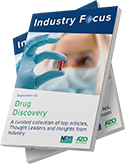The ALBORADA Drug Discovery Institute (ADDI) today (Tuesday 8 November) announced that it will collaborate with pharmaceutical company YD Global Life Science (YDGLS) to develop inhibitors of the unfolded protein response for the treatment of the diseases that cause dementia.
The ADDI, based at the University of Cambridge, is part of Alzheimer’s Research UK’s Drug Discovery Alliance, Its goal is to develop new medicines for neurodegenerative diseases. The ADDI is funded through a donation to Alzheimer’s Research UK by the ALBORADA Trust, a charitable foundation established by philanthropist Kirsten Rausing.
Drug Discovery eBook

The ADDI has developed modulators of the protein, eIF2B. These modulators are able to inhibit the unfolded protein response, a mechanism researchers believe causes neurodegeneration when chronically activated in the brain.
As part of the collaboration, the ADDI, YDGLS and affiliate SapiensBio will work together to further develop the existing modulators discovered at the University of Cambridge and also develop new chemical leads.
They will apply innovative medicinal chemistry, structural biology and machine learning approaches to develop further modulators and also identify a molecule ready for clinical development.
“This collaboration will help build on the exciting drug discovery programme at the ALBORADA Drug Discovery Institute” said Dr John Skidmore, Chief Scientific Officer of the ADDI. “Our chemistry shows great promise, and we are very excited to draw on the expertise of YDGLS to move our work further towards the clinic. The partnership will also benefit from SapiensBio’s proprietary technologies to develop further chemical leads against this important drug target.”
We are very excited to join the collaborative programme with the ALBORADA Drug Discovery Institute which has excellent experience of drug discovery against neurodegenerative diseases. We believe that YDGLS’s capability in chemistry and biology will complement the valuable expertise at theADDI.”
Dr Sihyeon An, Executive Director, YDGLS
“We look forward to working with the team at the ADDI and applying Sapientia, the data-driven and machine-learning-supported workflow of SapiensBio to the search for new medicines to tackle neurodegenerative diseases”, commented Dr Incheol Ryu, CEO of SapiensBio
Alzheimer’s Research UK
Posted in: Drug Discovery & Pharmaceuticals | Medical Condition News
Tags: Brain, Dementia, Drug Discovery, Life science, Machine Learning, Medicinal Chemistry, Molecule, Neurodegeneration, Neurodegenerative Diseases, Protein, Research, Structural Biology
Source: Read Full Article
